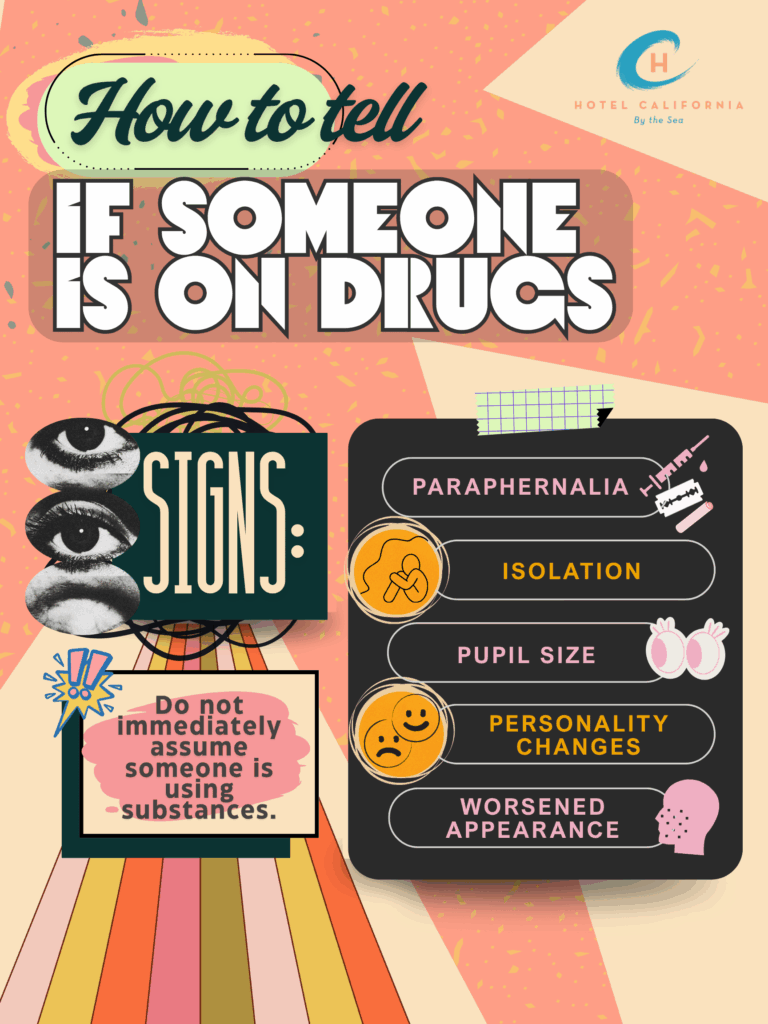How to tell if Someone is on Drugs
How do you tell if someone is on drugs? There are many different signs to look for when identifying if someone is on drugs. Drug addiction is a disease that can affect anyone. It does not discriminate against race, gender or economic status. Also referred to as substance use disorder, it is a mental illness that impacts the brain and behavior, leading to the inability to control the use of legal or illegal drugs and medicines. The most common types of drug addiction include substance abuse and alcohol abuse.

There is no one-size-fits-all when it comes to the typical characteristics of a person who is on drugs or is a drug addict. They can all act and appear different. Signs of drug use vary greatly based on the individual and the substance they are using. Signs of drug use can be physical, behavioral and psychological.
Drug addiction usually starts with experimental use of recreational drugs in a social setting. This is very common for young people. In these cases, drug use will become more and more frequent. Young people are more likely to display typical behaviors of drug use while going through adolescence. But sometimes it isn’t always obvious. For young people, it could just be stress, experiencing issues at work or school, experiencing mental health problems or just having a more difficult time sleeping.
Typical Signs on How to tell if someone is on Drugs
- Problems at school or work
- Physical health problems, including drastic weight loss and tooth decay
- Neglecting appearance and personal hygiene
- Changes in behavior with mood swings
- Money and financial issues
- Declining mental health, including the development or worsening of depression and anxiety
- Drastic changes in habits and daily routines
- Lack of motivation to pursue new hobbies
- Changes in relationships with friends and family
Physical Signs of Drug Use
There are a few common physical signs to spot that are typical of drug use. Sometimes, physical signs can be the easiest to spot and identify. Some common ones include:
- Red bloodshot eyes and dilated pupils.
- Changes in physical appearance and personal hygiene. Oftentimes, drug users become so addicted to their drug use, they no longer care about their outward appearance or keeping up with good hygiene. They may smell of smoke, have a messier appearance, be frequently red or flushed, have burnt spots or marks on their lips or fingers and can have track marks on the skin on their body.
- Changes in appetite, showing drastic weight loss or even drastic weight gain.
- Disturbed sleep patterns can turn into insomnia.
- Frequently sick, runny nose or having a bloody nose.
- Slurred speech or the inability to speak intelligibly.
- Seizures, nausea and vomiting.
- Poor dental hygiene.
- Changes in skin tone and the frequent appearance of scars or bruising.
- Hair loss.
- Extreme fatigue.

Behavioral Signs of Drug Use
- No longer attending work or school or no longer taking on responsibilities at work and school. They may have low motivation or lose interest in activities they once loved.
- Engaging in secretive behavior or suspicious behavior that is out of the norm. They may be more secretive with their phones or who they are meeting up with.
- Sudden changes in friends and the company they keep. This may also mean changes in relationships with friends and family members.
- Disappearing for long periods of time and going out more often than normal.
- Becoming more clumsy.
- Experiencing periods of sleepiness or, in contrast, high energy.
- Unexpected cash flow or having financial issues
- Locking doors.
- Avoid eye contact with others and become more withdrawn.
- Dramatic change in eating habits.
- Frequent injuries, loss of inhibitions and engaging in risky sexual behaviors.
Psychological Signs of Drug Use
- Unexplained changes in personality or changes in attitude.
- Sudden drastic mood swings such as irritability and angry outbursts or being fearful, anxious or paranoid for no reason.
- Spacing out often.
- Low self-esteem and a negative personality.
- Feeling symptoms of depression and anxiety.
- Hallucinations.
- Difficulty with cognition.
- Memory impairment.
- Hyperactivity and lack of focus.
Check Your Insurance Coverage for FREE
Find out if your insurance covers addiction treatment in minutes. We accept most insurance!
Signs of Drug Use by the Type of Drug
Signs of Alcohol Use
Alcohol is the most widely abused substance in the US due to ease of accessibility and availability. It is not a controlled substance and there is less stigma behind drinking alcohol because it is also used in many religious and cultural settings. It is a depressant drug that slows down the central nervous system and results in symptoms like calmness and lethargy.
For those who have become dependent on alcohol, it may be hard to stop drinking even after one or two drinks. This person may even prefer to drink alone or at odd times, not typical for social drinking. Those who abuse alcohol will continue to consume the drug even if it causes strain on relationships and will continue to drink despite negative consequences. They will even continue to drink despite the consequences to their physical health and emotional well-being.
Signs of Marijuana Use
Marijuana is now openly sold in many places, depending on the state. It is also a very commonly used substance among people of all ages. Some common signs of marijuana use include increased appetite and weight gain. Users might experience slower reaction times, slower cognition and difficulty with memory. In cases of abuse, a user may experience a sense of paranoia and suspicion. Marijuana use can result in bloodshot eyes, droopy eyelids and a more mellow demeanor.
Signs of stimulant drug use
Stimulant drugs work to increase activity in the central nervous system. It will make a person feel wired and highly energetic. Stimulant users can also feel increased agitation, insomnia or a burst of high energy. Stimulant users will also have dilated pupils and may have issues with nasal congestion and nosebleeds due to snorting cocaine. Other users will show signs of delusions, paranoia or even hostility.
Signs of Benzo Use
Benzos are central nervous system depressants and can make people feel calm and sedated with feelings of intoxication. Benzo users who abuse the drug can feel dizzy and off balance, have reduced energy and loss of motivation and experience depression and confusion. In some cases, they show a loss of inhibitions and may engage in out-of-character behavior.
Signs of Opioid Use
Opioids are highly potent and addictive drugs despite many of them being prescription medications. Users experience sedation, a slowed reaction time, difficulty with memory and are unable to fully concentrate. Users can also experience flu-like symptoms, mood swings and constipation.
Signs of Hallucinogen drugs and club drug Use
Hallucinogenic drugs include substances like PCP, LSD, ketamine and MDMA. These types of drugs make people hear or see things that aren’t really there. It causes muscle twitching, difficulty distinguishing between what is real and what is not. Users on these types of drugs have increased body temperature, can experience dehydration, experience a lack of coordination and can be seen clenching their teeth.
Do You have a Substance Addiction?
- Do you feel you have to use the drug regularly or daily?
- Do you have intense urges and cravings for drug use that block out other thoughts?
- Do you need to use more over time in order to experience the same effects?
- Do you take larger amounts of drugs over a longer period than you intended?
- Do you make sure you always have a supply of the drug?
- Do you spend money on the drug even when you cannot afford it?
- Do you skip out on work and home responsibilities and obligations because of drug use?
- Do you continue using the drug despite it causing problems in your life?
- Do you do things that you wouldn’t normally do because of drug use?
- Do you experience substance withdrawal because of drug use?
- If you answered yes to 2 or more of these questions, you may have a substance use disorder.
Reach out to Hotel California by the Sea
We specialize in treating addiction and other co-occurring disorders, such as PTSD. Our Admissions specialists are available to walk you through the best options for treating your addiction.
Treatment for Substance Use Disorder
Substance use disorder is a serious mental illness. It can affect anyone. How can you tell if someone is on drugs? There are some tell-tale signs of drug use and sometimes it can be more difficult to spot. The signs can be physical, behavioral and psychological. Professional behavioral treatment programs like Hotel California by the Sea provide treatment for substance use disorder. We can help you identify the signs of drug use.
We offer treatment at all levels of care including detox, residential, PHP and IOP. We utilize evidence-based treatment methods such as CBT, DBT and EMDR therapy. Hotel California by the Sea is dedicated to helping clients reach their goals of sobriety and overcome their addiction.
References:
https://www.mayoclinic.org/diseases-conditions/drug-addiction/symptoms-causes/syc-20365112
https://adf.org.au/talking-about-drugs/family-and-friends/why-people-use/tell-someone-using
https://zinniahealth.com/substance-use/blog/signs-someone-on-drugs
https://www.addictions.com/blog/youre-an-addict-how-to-tell-if-someone-is-addicted-to-drugs-or-alcohol
https://drugfree.org/article/signs-of-drug-use-in-teens/
https://www.addictiongroup.org/blog/signs-of-drug-use/
